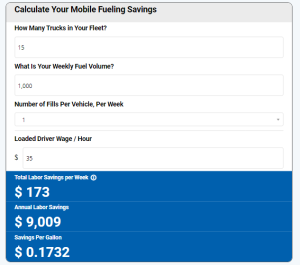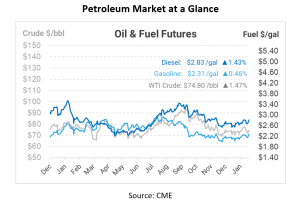
Is Mobile Refueling Cheaper Than Traditional Gas Stations? The Answer May Surprise You!
Ready to know if mobile refueling is cheaper than fueling up at traditional stations? First, picture this: You’re the project manager overseeing a large fleet of trucks where vehicles are constantly in use to meet tight deadlines. Keeping your equipment fueled and ready for action is a top priority to ensure smooth progress. However, the process of refueling typically involves taking your vehicles off-site to the nearest gas station, causing downtime and productivity losses.
One of the main considerations when evaluating any service is cost, and mobile fueling is no exception. Many fleet owners wonder if mobile refueling is cheaper than filling up at traditional gas stations. The answer, however, is not as straightforward as one might think.
Let’s take a look at some aspects that influence the cost of mobile fueling.
The Cost Aspect
The cost-effectiveness depends on the size of your transaction. For smaller fleets consisting of a small number of trucks, opting for mobile fueling might not seem financially viable. The real cost savings come into play when you have a larger fleet. The economies of scale that go with larger transactions and fleets make the cost per gallon significantly more attractive.
When does mobile fueling start to make sense from a cost perspective? Generally, businesses with 10 or more vehicles start saving in labor costs, while those with at least 20 to 25 vehicles tend to break even or even save money on their bottom line. At this scale, the efficiency gains and potential volume discounts can outweigh the costs associated with traditional gas stations.
The Convenience Factor
One of the standout benefits of mobile fueling is the convenience it offers, providing remote fuel delivery that saves both time and effort. This not only boosts productivity but also reduces the burden on drivers.
Mobile fueling can also help companies reduce operational costs by providing better visibility into fueling transactions. This enhanced visibility allows managers to better manage fuel usage and their fleet operations. Moreover, it operates 24/7, ensuring that fleet vehicles and machinery have access to fuel around the clock, even during late-night shifts.
Other Factors
While fleet size plays a crucial role in determining the cost-effectiveness of mobile refueling, other aspects also come into play:
- Location: The geographical location of your fleet can affect mobile fueling costs. Fuel prices can vary from one area to another, so it’s essential to consider regional differences.
- Delivery Frequency: How often you require fuel delivery can impact costs. Frequent deliveries may lead to increased service charges, so plan your fueling schedule wisely.
- Service Providers: Different mobile fueling companies may offer varying pricing structures and discounts. It’s crucial to find a dependable supplier that offers the best deal for your specific needs.
Responsive Service, Reliable Supply
For vehicles, mobile equipment, and stationery fuel tanks, Mansfield Mobile Fueling Services deliver fuel to you – where and when it’s needed. Mobile Fueling happens while your drivers are off the clock. The Mansfield Mobile Fueling team comes to your site and fuels your vehicles and equipment. Overnight or anytime. Your drivers appreciate not having to wait in gas lines, and you can keep them on the road longer – being productive.
Still not sure if mobile fueling is the right option for your business? Click here to use our calculator to see the potential savings your business could experience by converting to mobile fueling. Contact a Mobile Fueling expert at Mansfield to learn how to keep your drivers on the road longer or your stationery tanks and generators filled – all while reducing operating costs. It’s a win-win.


This article is part of Daily Market News & Insights
Tagged: Mobile Refueling, Traditional Gas Stations
MARKET CONDITION REPORT - DISCLAIMER
The information contained herein is derived from sources believed to be reliable; however, this information is not guaranteed as to its accuracy or completeness. Furthermore, no responsibility is assumed for use of this material and no express or implied warranties or guarantees are made. This material and any view or comment expressed herein are provided for informational purposes only and should not be construed in any way as an inducement or recommendation to buy or sell products, commodity futures or options contracts.





